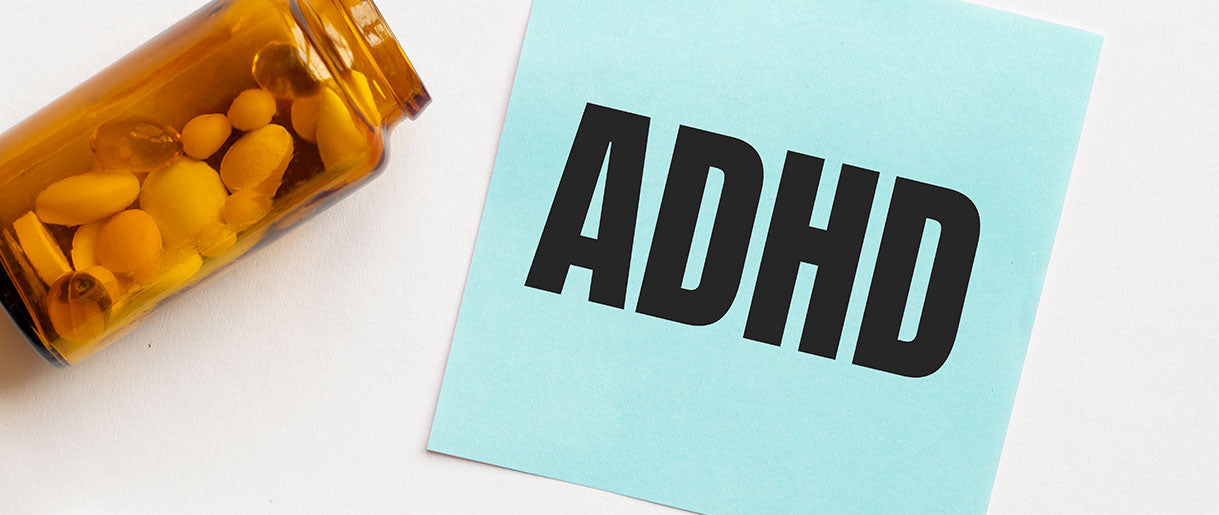Amid the chaos that comes with dealing with ADHD, there's a rising chorus singing the praises of nootropics as potential conductors of cognitive harmony. We're talking about Omega-3 Fatty Acids (think brain food!), Zinc (the cool, calm one), Magnesium (Mr. Balanced), Rhodiola Rosea (your stress buster), and Ginkgo Biloba (the memory maestro).
And that's not all. There's also L-Theanine(chill vibes), Bacopa Monnieri (memory's best friend), Panax Ginseng (the energy booster), Ashwagandha (the anxiety soother), and Vinpocetine (sharp as a tack).
Sounds like a superhero team for your brain, right? Let's dig into how each of these can play a role in helping with ADHD.
1. Omega 3 Fatty Acids
Ever wondered if there's something simple yet powerful to help with ADHD? Enter Omega-3 Fatty Acids, the unsung heroes of brain health.
These aren't just any nutrients; they are crucial for optimal brain function (1). Think of them as the premium fuel that keeps your brain's engine running smoothly.
Particularly for ADHD, Omega-3s can be like a breath of fresh air for a mind struggling to find calm and focus:
- Enhanced Focus: They can help sharpen your attention, making it easier to stay on task.
- Mood Regulation: Omega-3s are known to aid in mood stabilization (2), which can be a game-changer in managing ADHD-related mood swings.
- Reduced Hyperactivity: Some studies (3) suggest these fatty acids can decrease hyperactivity and impulsiveness.
- Overall Brain Health: Regular intake of Omega-3s contributes to overall brain health (4), which is vital for anyone, but especially if you have ADHD.
Now, you might wonder, "Where do I get these amazing Omega-3s?" Great question! The best sources are often the simplest:
- Fatty Fish: Salmon, mackerel, and sardines are loaded with Omega-3s.
- Plant Sources: Flaxseeds, chia seeds, and walnuts are great for vegans and vegetarians.
Just a heads-up, though—while adding Omega-3s to your diet can be beneficial, it's always a good idea to consult with a healthcare professional before starting any new supplement regimen, especially for managing ADHD. This nootropic for focus will offer maximum help when you work with your doctor to make it fit into your evening or morning routine for ADHD.
2. Zinc

Have you ever considered the role minerals play in your brain's health? Zinc, for instance, is like a fine-tuner for your cognitive radio.
It's not just a mineral; it's a cognitive superstar, especially when managing ADHD. Zinc plays a crucial role in neurotransmitter function and brain health, making it essential for those seeking to improve focus and mental clarity:
- Neurotransmitter Regulation: Zinc helps neurotransmitters function properly (5), essential for sending the right signals to your brain.
- Attention Boost: It's linked to improved concentration and attention span, which can be a game-changer for anyone with ADHD.
- Mood Stabilization: Zinc also plays a role in mood regulation (6), which is often a challenge in ADHD. An excellent addition to a morning routine for anxiety, this nootropic also fights depression and anxiety, according to research (7).
So, where do you get this fantastic mineral? Zinc is pretty easy to include in your diet:
- Meat and Poultry: They are excellent sources of Zinc. Think chicken, beef, or turkey.
- Seafood: Oysters, crab, and lobster are delicious and packed with Zinc.
- Vegetarian Options: For non-meat eaters, lentils, chickpeas, and black beans are great sources.
- Nuts and Seeds:Pumpkin seeds, cashews, and almonds can be a tasty snack that boosts your zinc intake.
Remember, balance is key. While adding Zinc to your diet can be beneficial, too much of it can be counterproductive. If you're considering zinc supplements for ADHD, it's best to consult with a healthcare professional to find the right balance for your specific needs.
3. Magnesium
Picture this: a natural element that nourishes your body and brings a sense of calm to your bustling mind. That's Magnesium for you, especially valuable for those managing ADHD.
It's like a gentle wave of calm that washes over your brain, helping to soothe and stabilize it. In the world of ADHD, where the brain often feels like it's on a never-ending roller coaster, Magnesium can be the much-needed brake:
- Stress Reduction: Known for its calming properties, it can help reduce anxiety and stress (8), common companions of ADHD.
- Improved Sleep: Magnesium aids in better sleep (9), which is crucial for managing ADHD symptoms effectively.
- Enhanced Focus: Calming the nervous system, Magnesium can help improve concentration and reduce restlessness.
- Overall Brain Health: Magnesium is vital for brain health (10), supporting various crucial brain functions for those with ADHD.
Now, you're probably wondering, "Where can I find this magical mineral?" Magnesium is quite accessible:
- Leafy Greens: Spinach and kale are not just for salads; they're packed with Magnesium.
- Nuts and Seeds: Almonds, cashews, and pumpkin seeds are tasty and great sources of Magnesium.
- Whole Grains: Brown rice and whole wheat bread can be delicious parts of your magnesium-rich diet.
In short, Magnesium might just be the unsung hero in your journey with ADHD. It's not about dramatic changes but finding that gentle, steady rhythm for your brain to function at its best. Give it a try; your mind might just thank you for that extra calm and focus.
4. Rhodiola Rosea

Imagine a natural remedy that boosts your brain's performance and keeps your stress levels in check. That's Rhodiola Rosea for you, particularly a gem for those juggling the complexities of ADHD.
Often hailed as an adaptogen, this remarkable herb helps your body adapt to stress more effectively, making it a valuable ally in the ADHD toolkit:
- Stress Management: It helps in reducing mental fatigue (11) and managing stress (12), which is often heightened in ADHD.
- Enhanced Focus: By fighting fatigue, it aids in improving concentration and mental clarity. This makes it one of the best nootropics for brain fog.
- Mood Improvement: Rhodiola is known to have mood-stabilizing effects (13), which can be beneficial for the emotional dysregulation commonly associated with ADHD.
- Energy Boost: It's not just about calming; it also provides a gentle energy boost in the morning, helping you stay alert without the jitters.
Rhodiola Rosea could be a game-changer in your ADHD management strategy. It's not just about dampening the symptoms; it's about empowering your brain to handle them with more resilience and vitality.
5. Ginkgo Biloba
Let's step back in time to discover Ginkgo Biloba, a living fossil that has graced our planet for over 200 million years. Today, it's not just a testament to endurance but also a sought-after remedy for those with ADHD.
Known for its remarkable benefits for brain health, Ginkgo Biloba is like a time-honored sage for your cognitive needs. For individuals navigating the challenges of ADHD, it offers a unique blend of cognitive support and mental sharpness:
- Improved Concentration: It's famed for enhancing focus and reducing brain fog (14), a common hurdle in ADHD.
- Memory Support: One of the best nootropics for memory, Ginkgo aids in memory retention (15) and recall, which can be particularly beneficial for those with ADHD.
- Blood Flow Boost: Improving blood flow to the brain (16), this herb helps enhance cognitive functions and overall brain health.
- Antioxidant Properties: Ginkgo is rich in antioxidants (17), which protect your brain cells from damage and support long-term cognitive health.
Ginkgo Biloba isn't just a supplement; it's a bridge to a more focused and sharper mind. For those with ADHD, it could be the key to unlocking greater cognitive clarity and an enhanced ability to concentrate.
6. L-Theanine

Let's talk about L-Theanine, a unique amino acid commonly found in green tea. It's like a gentle warrior, quietly fighting against the chaos of ADHD.
While it doesn't claim the limelight like caffeine, it's a powerhouse in its own right, especially when it comes to managing ADHD symptoms.
L-Theanine is known for its ability to promote relaxation without drowsiness, making it an ideal choice for those seeking a calm yet alert state of mind:
- Calming Effect: It increases the levels of calming brain chemicals, helping reduce anxiety and stress (18), which are often companions of ADHD.
- Improved Focus: By promoting a relaxed but alert state, L-Theanine can help enhance concentration, a core challenge in ADHD.
- Better Sleep: It aids in improving sleep quality (19), crucial for those with ADHD who often struggle with sleep issues.
- Mood Regulation: L-Theanine contributes to stabilizing mood (20), addressing the emotional fluctuations commonly experienced in ADHD.
L-Theanine offers a gentle yet effective approach to managing ADHD symptoms. It's like a soothing melody for your brain, bringing a sense of calm and focus amidst the daily hustle.
7. Bacopa Monnieri
Next up on our journey through nootropics is Bacopa Monnieri, an herb steeped in Ayurvedic tradition, now making waves in the modern world of ADHD management.
Known as Brahmi in traditional Indian medicine, Bacopa Monnieri isn't just a plant; it's a cognitive enhancer supporting memory and brain function for centuries.
For those with ADHD, it offers a promising natural approach to enhancing cognitive abilities and easing the symptoms of this condition:
- Memory Boost: Bacopa is celebrated for improving memory retention (21) and recall, crucial for people with ADHD who struggle with forgetfulness.
- Increased Attention Span: It helps enhance attention (22) and focus, addressing one of the core challenges of ADHD.
- Stress Relief: Bacopa has adaptogenic properties (23), meaning it helps the body resist stress, a common issue for those with ADHD.
- Neuroprotection: It also offers neuroprotective benefits (24), safeguarding the brain against potential damage and promoting overall brain health.
Bacopa Monnieri is more than just an herb; it's a natural cognitive booster that might just be what you need to manage ADHD symptoms more effectively. Its blend of memory-enhancing and stress-relieving properties makes it a noteworthy addition to your ADHD toolkit.
8. Panax Ginseng

Moving on to Panax Ginseng, a root with a storied history in traditional Chinese medicine, now finding its place in the modern ADHD management arsenal.
Panax Ginseng stands out as an adaptogen, known for its ability to help the body withstand mental and physical stress.
For those with ADHD, it's like a natural source of sustained energy and mental clarity, helping to combat the common symptoms of fatigue and lack of focus:
- Cognitive Enhancement: It improves cognitive functions (25), including memory (26), attention, and mental clarity.
- Increased Energy Levels: Ginseng provides a natural energy boost (27), helping those with ADHD combat feelings of tiredness and lethargy. This makes it a great addition to a morning routine for energy.
- Mood Improvement: It has been observed to help stabilize mood (28) and reduce anxiety, which can be particularly beneficial for people living with ADHD.
- Stress Reduction: As an adaptogen (29), it helps the body cope better with stress, a common issue in ADHD.
Panax Ginseng offers a unique combination of energy-boosting and cognitive-enhancing properties that can be particularly beneficial for those managing ADHD. It's a natural way to help keep your mind sharp and your energy levels steady throughout the day.
9. Ashwagandha
Let's delve into Ashwagandha, an ancient herb revered in Ayurvedic medicine, now gaining popularity as a natural remedy for ADHD. Ashwagandha stands out as a natural stress reliever known for its adaptogenic properties.
For those dealing with ADHD, it offers a holistic approach to managing not just the cognitive aspects but also the emotional and psychological challenges that often accompany this condition:
- Stress and Anxiety Reduction: It's known to lower cortisol levels, thereby reducing stress and anxiety (30), which are common in individuals with ADHD.
- Improved Focus and Clarity: By reducing stress, Ashwagandha can help improve concentration and mental clarity, addressing key ADHD symptoms.
- Enhanced Mood Stability: It aids in balancing mood swings (31), making emotional regulation more manageable for those with ADHD.
- Cognitive Support: Some studies suggest it may also support overall cognitive function (32), which is beneficial for ADHD management.
Ashwagandha offers a multifaceted approach to managing ADHD, tackling both the mental and emotional aspects. Its natural stress-relieving properties can be a game changer, providing a sense of calm and focus often sought in ADHD management.
10. Vinpocetine
Lastly, let's explore Vinpocetine, a synthetic derivative of the periwinkle plant, increasingly recognized for its potential benefits in ADHD management.
Vinpocetine stands out for its ability to enhance cerebral blood flow, improving cognitive functions. For individuals with ADHD, it offers a path to enhanced mental clarity, focus, and memory, addressing some of the core challenges of this condition:
- Improved Blood Flow to the Brain: It increases cerebral circulation (33), leading to better cognitive function and mental alertness.
- Enhanced Memory and Learning: One of the best nootropics for studying, Vinpocetine is known to aid memory and cognitive processing, which can be particularly beneficial for those struggling with ADHD-related cognitive difficulties.
- Increased Attention Span: By improving brain function, it can help individuals with ADHD maintain focus and concentration (34) for longer periods.
- Neuroprotection: It also offers protective benefits to brain cells (35), supporting overall brain health.
Vinpocetine presents a unique approach to enhancing brain function, offering hope for improved focus, memory, and cognitive clarity for those with ADHD. Its role in increasing cerebral blood flow and protecting brain cells makes it an intriguing option in ADHD management strategies.
FAQs About Nootropics for ADHD
What Are The Long-Term Effects Of Taking Nootropics For ADHD?
Long-term effects of nootropics on ADHD vary depending on the specific substance and individual response. While many nootropics are considered safe with few side effects, the scientific understanding of their long-term impact is still evolving.
Some nootropics have been shown to offer sustained cognitive benefits with continued use. Still, it's important to approach their use cautiously and under medical supervision, especially when used in conjunction with ADHD medications.
Can Nootropics Replace Traditional ADHD Medications?
Nootropics are not generally considered a replacement for traditional ADHD medications, which are clinically proven to be effective for many individuals. However, nootropics may complement existing ADHD treatments or offer alternative options for those who experience adverse effects from conventional medications.
Individuals need to consult with healthcare professionals before making any changes to their treatment plans. Some may find that nootropics, along with behavioral therapies and lifestyle changes, can help manage symptoms of ADHD, but this should be a personalized decision based on individual health needs.
Are There Any Nootropics That Specifically Target ADHD-Related Brain Fog And Inattention?
Certain nootropics, like Omega-3 fatty acids, Ginkgo Biloba, and Panax Ginseng, have shown potential in addressing ADHD-related brain fog and inattention through various small-scale studies and anecdotal evidence.
These nootropics are thought to support brain function by improving blood flow and neurotransmitter activity, which can help with mental clarity and focus. However, responses can be individual, and what works for one person might not work for another.
Therefore, users need to monitor their responses to specific nootropics and consult healthcare providers to tailor a regimen that addresses their unique symptoms.
Key Takeaways
As we close the chapter on this exploration of nootropics for ADHD, it's important to remember that managing ADHD is a personal, ongoing journey.
Nootropics present an exciting frontier with the potential to support cognitive function and mitigate some of the challenges associated with ADHD. While they are not a one-size-fits-all solution, they offer hope for those seeking to enhance their mental performance naturally.
Whether you're a curious newcomer to the world of nootropics or an experienced explorer in the vast landscape of ADHD management, the key is to approach this journey with an open mind, patience, and the guidance of healthcare professionals. Remember that the ultimate goal is to find balance and strategies that work uniquely for you.
We hope this article has illuminated some pathways and options that resonate with your experiences or piqued your interest to learn more. As the conversation around ADHD and nootropics continues to evolve, we invite you to become an active participant.
Share your stories, successes, or even the hurdles you've encountered. Your insights enrich your journey and could light the way for others navigating similar paths.
Have you tried any nootropics for ADHD, or do you have questions about starting? Leave a comment below and join the dialogue. Your voice is a valuable part of this community; together, we can build a wealth of shared wisdom.
References
- The Importance of Marine Omega-3s for Brain Development and the Prevention and Treatment of Behavior, Mood, and Other Brain Disorders, (1), https://www.ncbi.nlm.nih.gov/pmc/articles/PMC7468918/
- Omega-3 fatty acids and the treatment of depression: a review of scientific evidence, (2), https://www.ncbi.nlm.nih.gov/pmc/articles/PMC5481805/
- Critical appraisal of omega-3 fatty acids in attention-deficit/hyperactivity disorder treatment, (3), https://www.ncbi.nlm.nih.gov/pmc/articles/PMC4968854/
- Effects of Omega-3 Polyunsaturated Fatty Acids on Brain Functions: A Systematic Review, (4), https://www.ncbi.nlm.nih.gov/pmc/articles/PMC9641984/
- Zinc in the central nervous system: From molecules to behavior, (5), https://www.ncbi.nlm.nih.gov/pmc/articles/PMC3757551/
- Role of zinc in the development and treatment of mood disorders, (6), https://pubmed.ncbi.nlm.nih.gov/20689416/
- The Emerging Role for Zinc in Depression and Psychosis, (7), https://www.ncbi.nlm.nih.gov/pmc/articles/PMC5492454/
- Magnesium Status and Stress: The Vicious Circle Concept Revisited, (8), https://www.ncbi.nlm.nih.gov/pmc/articles/PMC7761127/
- The effect of magnesium supplementation on primary insomnia in elderly: A double-blind placebo-controlled clinical trial, (9), https://www.ncbi.nlm.nih.gov/pmc/articles/PMC3703169/
- Magnesium and the Brain: A Focus on Neuroinflammation and Neurodegeneration, (10), https://www.ncbi.nlm.nih.gov/pmc/articles/PMC9820677/
- Rhodiola rosea for physical and mental fatigue: a systematic review, (11), https://www.ncbi.nlm.nih.gov/pmc/articles/PMC3541197/
- Rhodiola rosea L.: an herb with anti-stress, anti-aging, and immunostimulating properties for cancer chemoprevention, (12), https://www.ncbi.nlm.nih.gov/pmc/articles/PMC6208354/
- The Effects of Rhodiola rosea L. Extract on Anxiety, Stress, Cognition and Other Mood Symptoms, (13), https://pubmed.ncbi.nlm.nih.gov/26502953/
- Ginkgo biloba Extract Containing Plasmalogen May Improve Long COVID and Brain Fog: A Case Report, (14), https://www.jelsciences.com/articles/jbres1589.pdf
- An Updated Review of Randomized Clinical Trials Testing the Improvement of Cognitive Function of Ginkgo biloba Extract in Healthy People and Alzheimer’s Patients, (15), https://www.frontiersin.org/articles/10.3389/fphar.2019.01688/full
- Effects of Ginkgo biloba on cerebral blood flow assessed by quantitative MR perfusion imaging: a pilot study, (16), https://pubmed.ncbi.nlm.nih.gov/21061003/
- Properties of Ginkgo biloba L.: Antioxidant Characterization, Antimicrobial Activities, and Genomic MicroRNA Based Marker Fingerprints, (17), https://www.mdpi.com/1422-0067/21/9/3087
- Effects of L-Theanine Administration on Stress-Related Symptoms and Cognitive Functions in Healthy Adults: A Randomized Controlled Trial, (18), https://www.ncbi.nlm.nih.gov/pmc/articles/PMC6836118/
- In Search of a Safe Natural Sleep Aid, (19), https://pubmed.ncbi.nlm.nih.gov/25759004/
- How does the tea L-theanine buffer stress and anxiety, (20), https://www.sciencedirect.com/science/article/pii/S2213453021001324
- Does Bacopa monnieri improve memory performance in older persons? Results of a randomized, placebo-controlled, double-blind trial, (21), https://pubmed.ncbi.nlm.nih.gov/20590480/
- Effects of 12-Week Bacopa monnieri Consumption on Attention, Cognitive Processing, Working Memory, and Functions of Both Cholinergic and Monoaminergic Systems in Healthy Elderly Volunteers, (22), https://www.ncbi.nlm.nih.gov/pmc/articles/PMC3537209/
- Effects of a Standardized Bacopa monnieri Extract on Cognitive Performance, Anxiety, and Depression in the Elderly: A Randomized, Double-Blind, Placebo-Controlled Trial, (23), https://www.ncbi.nlm.nih.gov/pmc/articles/PMC3153866/
- Neuroprotection with Bacopa monnieri-A review of experimental evidence, (24), https://pubmed.ncbi.nlm.nih.gov/33675463/
- Cognition enhancing effect of panax ginseng in Korean volunteers with mild cognitive impairment: a randomized, double-blind, placebo-controlled clinical trial, (25), https://www.ncbi.nlm.nih.gov/pmc/articles/PMC6989239/
- Panax ginseng (G115) improves aspects of working memory performance and subjective ratings of calmness in healthy young adults, (26), https://pubmed.ncbi.nlm.nih.gov/20737519/
- Efficacy of Ginseng Supplements on Fatigue and Physical Performance: a Meta-analysis, (27), https://www.ncbi.nlm.nih.gov/pmc/articles/PMC5102849/
- Mechanisms of Panax ginseng action as an antidepressant, (28), https://www.ncbi.nlm.nih.gov/pmc/articles/PMC6869450/
- Adaptogenic effects of Panax ginseng on modulation of immune functions, (29), https://www.ncbi.nlm.nih.gov/pmc/articles/PMC7790873/
- Adaptogenic and Anxiolytic Effects of Ashwagandha Root Extract in Healthy Adults: A Double-blind, Randomized, Placebo-controlled Clinical Study, (30), https://www.ncbi.nlm.nih.gov/pmc/articles/PMC6979308/
- A Prospective, Randomized Double-Blind, Placebo-Controlled Study of Safety and Efficacy of a High-Concentration Full-Spectrum Extract of Ashwagandha Root in Reducing Stress and Anxiety in Adults, (31), https://www.ncbi.nlm.nih.gov/pmc/articles/PMC3573577/
- Effects of Acute Ashwagandha Ingestion on Cognitive Function, (32), https://www.ncbi.nlm.nih.gov/pmc/articles/PMC9565281/
- An update on Vinpocetine: New discoveries and clinical implications, (33), https://www.ncbi.nlm.nih.gov/pmc/articles/PMC5766389/
- Effect of Vinpocetine (Cognitol™) on Cognitive Performances of a Nigerian Population, (34), https://www.ncbi.nlm.nih.gov/pmc/articles/PMC4160700/
- Safety and Efficacy of Vinpocetine as a Neuroprotective Agent in Acute Ischemic Stroke: A Systematic Review and Meta-Analysis, (35), https://www.ncbi.nlm.nih.gov/pmc/articles/PMC9053840/









Let Us Know Your Comments